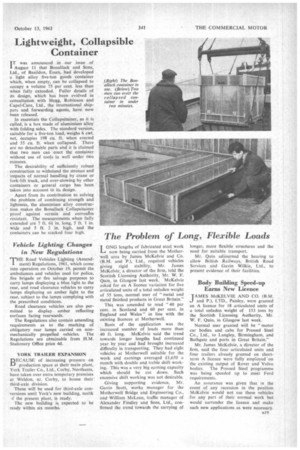The Problem of Long, Flexible Loads
Page 53

If you've noticed an error in this article please click here to report it so we can fix it.
LONG lengths of fabricated steel work La now being carried from the Motherwell area by James McKelvie and Co. (RM. and P.), Ltd., required vehicles giving rigid stability, Mr. James McKelvie, a director of the firm, told the Scottish Licensing Authority, Mr. W. F. Quin, in Glasgow last week. McKelvie asked for an A licence variation for five articulated units of a total unladen weight of 55 tons, normal user of "metal and metal finished products in Great Britain."
This was amended to read "40 per cent in Scotland and 60 per cent, in England and Wales" in line with the existing licences at Motherwell.
Basis of the application was the increased number of loads more than 40 ft. long. McKelvie -said the trend towards longer lengths had continued year by year and had brought increased difficulty in transporting. They had eight vehicles at Motherwell suitable for the work and earnings averaged 11,650 a month with double and treble shift working. This -was a very big earning capacity which should be cut down. Such excessive shift working was not desirable.
Giving supporting evidence, Mr. Gavin Scott, works manager for the Motherwell Bridge and Engineering Co., and William McLean, traffic manager of Alexander Findley and Sons, Ltd., confirmed the trend towards the carrying of longer, more flexible structures and the need for suitable transport Mr. Quin adjourned the hearing to allow British .Railways, British Road Services and Gavin Wilkie, Ltd., to present evidence of their facilities.
Body Building Speed-up Earns New Licence
TAMES McKELVIE AND CO. (B.M.
J and P.), LTD„ Paisley, were granted an A licence for 18 articulated units of a total unladen weight of' 153 tons by the Scottish Licensing Authority, Mr. W. F. Quin, in Glasgow last week.
Normal user granted will be 'motor car bodies and cabs for Pressed Steel Co., Ltd., to Langley, Birmingham, and Bathgate and ports in Great Britain."
Mr. James McKelvie, a director of the firm, said the four articulated units and four trailers already granted on shortterm A licence were fully employed on the existing output of Rover and Volvo bodies. The Pressed Steel programme was being speeded up to meet Ford requirements.
An assurance was given that in the event of any recession in the position McKelvie would not use these vehicles for any part of their normal work but would surrender the licence and make such new applications as were necessary.




































































































































